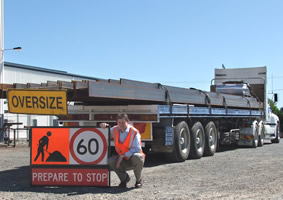|
Where did you grow up and go to school?
Yes, I do suppose I am a Scientist - by elimination and chance. I was born and raised in Gosford, NSW, before moving to Tasmania with my parents at 13 years of age. Here I attended High School in the North-West at Marist Regional College.
What did you study at uni?
After a gap year I enrolled at the University of Tasmania. I chose subjects, not a field; Geography, Mathematics, History and Physics. The Enrolment Staff told me this combination would make up a Science Degree so that's what I would undertake. After first year I wasn't enjoying History as much and Physics was more challenging than I anticipated. So I concentrated my efforts on Geography and Mathematics for the remainder of my Degree. However, it was Geography that really interested me; it was so diverse and 'made sense' to me. I studied GPS and GIS, Urban Planning, Wilderness and Natural Area Management, Natural Resource Management, Climatology, and much more.
What do composting toilets have to do with science?
After my Bachelors degree I decided to do a further year of study in the Honours program, so I approached my favourite Lecturer, Assoc. Prof. John Todd to see if he had any projects on offer. He had several ideas, but it was his enthusiasm and the humour of the topic that saw me investigate 'Composting Toilets in Cold Remote Locations' as my Honours study. People immediately laugh at the topic but it was the most fulfilling study I've ever undertaken. The study investigated solar technologies and how these could be applied to improve the performance of composting toilets in remote areas. I even built my own structure and recorded temperatures under various conditions such as with the addition of insulation and the use of double glazing. As much as it was also study it was an experience that enabled me to investigate a hypothesis, conduct an experiment and report the results.
 Where do you work now?
Following the completion of my study I returned to the North-West and received a position with Tioxide Australia Pty Ltd constructing a Bio-remediation Treatment System - in many ways similar to a giant Composting Toilet. The treatment system cost $30 million and treated contaminated liquid leaching from sludge dams used to dump solid waste during the life of the factory. The system utilised natural products and technologies including:
- several hundred kilograms of waste potatoes to raise the pH of the leachate;
- mushroom compost and straw to harbour micro-organisms to change the form of contaminates within the leachate;
- a giant race and drop-out ponds to aerate the leachate and drop-out the contaminates; and
- four wetland ponds to filter any remaining contaminates.
All this produced an almost self-sufficient treatment system to ensure clean water exited the site.
After the commissioning of the Treatment System I travelled for 6-months before returning once again to the North-West, this time to undertake my current position at Van Ek Contracting Pty Ltd (VEC). My position title is Project Administrator - Systems, which means I assist the Systems Manager and Project Managers in the implementation of VEC's Quality, Environment and Safety Systems on its Projects. VEC are a construction company which earned its reputation building bridges and has further diversified into roadworks.
Nowadays, there are increasing requirements on businesses to meet Legislative requirements, Australian Standards, and Client Specifications. These boundaries are based on trials and experience, and the methods for ensuring quality is upheld, the environment is protected and employees work safely are founded on science. And if companies are to remain competitive they need to invest in the outcomes of science, employ best practice and educate their employees.
|
